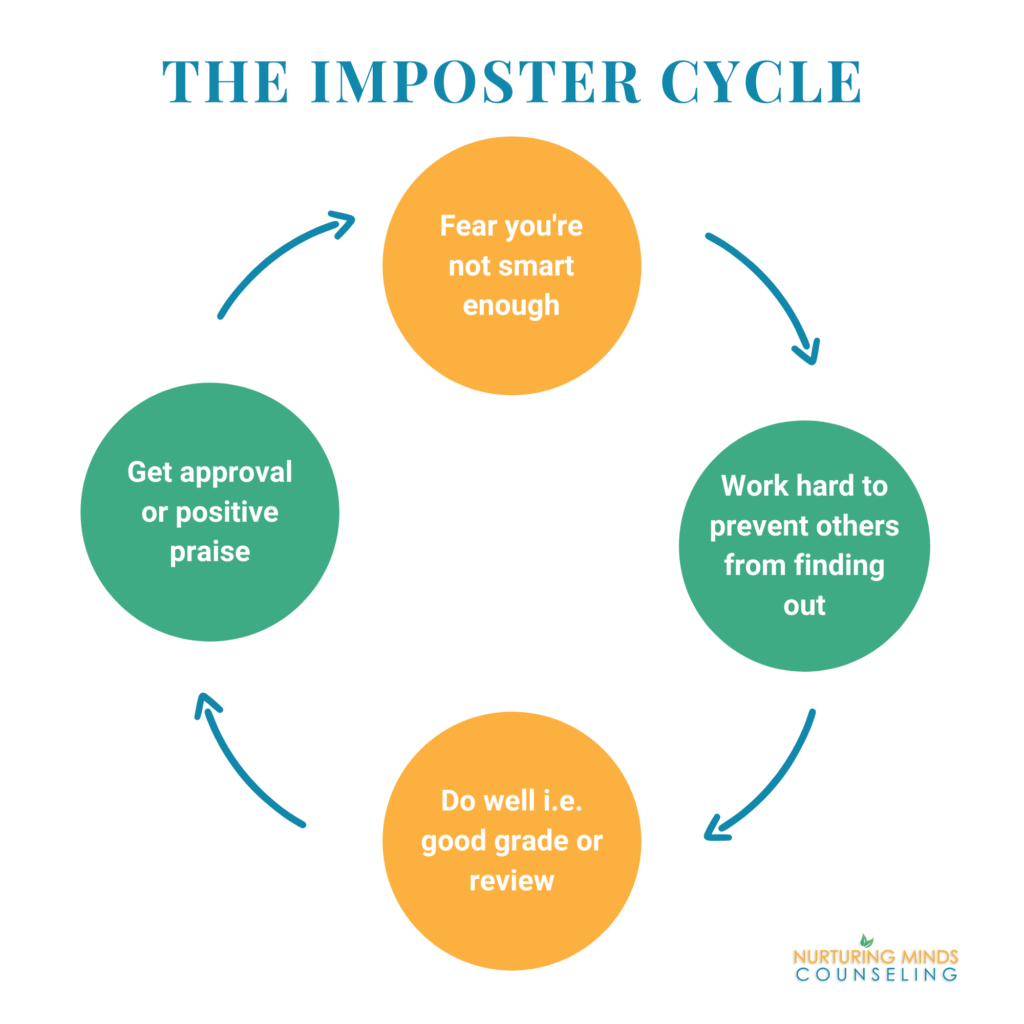Hello! My name is Diana Garcia, a Licensed Mental Health Counselor in Florida and the owner of Nurturing Minds Counseling. Do you struggle with feelings of inadequacy at work? Is this a persistent and constant feeling that stays with you no matter how successful you are? If so, you might be struggling with Imposter Syndrome in the workplace. Watch this video for 7 Signs of Imposter Syndrome at Work or scroll down to read the blog.
Watch the Video on “7 Signs of Imposter Syndrome at Work”:
Read the Blog for 7 Signs of Imposter Syndrome in the Workplace:
What is Imposter Syndrome?
Let’s start with what is impostor syndrome? The term was coined in the 70s by two psychologists – Pauline Rose Clance & Suzanne Imes. They initially called it “The Imposter phenomenon,” a trend they noticed with high achieving women. Regardless of how much these women were achieving or how well they were doing, they could not internalize their success or achievement; they still felt like frauds or imposters.
Currently, the term used is Imposter Syndrome, and it’s a sense that you feel like a fraud, downplay your accomplishments, and never feel good enough. This shows up primarily at work or school, with a significant focus on your intelligence. No matter how well you do, you don’t feel competent enough and fear that eventually others will notice it. They will think that you just maybe got lucky or are hard-working, but you’re not smart enough or don’t know enough to do well in this position.
Let’s start exploring what are some common signs of Imposter Syndrome in the workplace.
Sign 1: You over-work
One sign is that you tend to overwork. Because you feel like you don’t know enough, are not smart enough, and are a fraud, your mind convinces you that you must do something to prevent others from learning this.
You compensate by working more. Maybe you take on more tasks than your colleagues, or you don’t set boundaries, and you’ll check your email at all-night hours. All in a frenetic effort to make sure that you’re constantly proven your worth to your peers and supervisors.
So you tend to add more and more to your plate to compensate for this feeling of being inadequate or not good enough at work. Although this leaves you feeling exhausted, potentially resentful, and overwhelmed.
Sign 2: You don’t internalize your successes
This goes back to the definition, but you don’t internalize your successes or accomplishments. You attribute your accolades to every other reason except your actual merit. You think:
- Maybe you just got lucky.
- Your boss is a nice person and gave it to you.
- It’s effortless to get promoted in your company.
- You just knew the right person.
- You’re good at appearing competent, but you’re not.
And on and on, the list goes. This tendency is tricky because no matter how well you do or what position you’ve earned, your mind will still find some way to downplay how you got there and find other reasons why that’s the case.
Sign 3: Heightened fear of failure
This sign isn’t just associated with imposter syndrome. But in general, I noticed that people who struggle with impostor syndrome are afraid of failing. So much so that it might lead them not to share ideas or put themselves out there. Maybe this can look like needing to be flawless or perfect before contributing an idea or presenting a project.
Maybe that might lead to procrastinating because of this constant fear of failing. As counterintuitive as it might be, if there’s a potential fear of falling, that thought might trigger so much anxiety and get you paralyzed, unable to even start the task. Which only then makes the feeling more intense because you’re dealing with the feeling of being behind schedule.
Sign 4: Underestimate your capability
Another sign is you tend to underestimate your ability. So let’s say your boss says, ” Hey, I want to give you this new project. There’s a lot of new exciting, innovative things.” Your immediate instance is to downplay or doubt whether you have what it takes to take this on despite evidence to the contrary.
Maybe this sign shows up as a reluctance to apply for a promotion or new position because you devalue what you bring to the table. Instead, you decide to stay in the safe, comfortable zone of the job where you already know what to do.
Sign 5: Engage in the Imposter Cycle
As you can see from the image below, here’s the Imposter Cycle.

This concern about not being smart enough is at the core here, this fear that you’re just not smart enough. So then you tend to overwork, do more, and do a lot to ensure no one else notices you’re self-perceived lack of intelligence. You get an excellent grade or positive review, leading to approval. You might temporarily feel okay, but this fear of not being smart enough back creeps in.
So no matter the outcome, this fear that you’re not smart enough still gets re-activated and leads you to engage in the cycle again. One way to start stepping out of the cycle is to understand the role that this underlying fear plays and shift your reaction to this fear.
Sign 6: You’re struggling with Burn Out
You might notice that you’re struggling with Burn Out from years or months of engaging with your imposter syndrome.
According to the WHO, Burn-out is defined in ICD-11 as follows:
Burn-out is a condition that results from persistent occupational stress that you’re struggling to cope with. Three dimensions characterize it:
- Fatigue or exhaustion
- Increased negativity or cynicism towards your job and increased mental distance from one’s job
- Reduced workplace effectiveness
It’s easy to see how Imposter Syndrome can play a role in developing Burn Out. If you’re overworking and never feeling proud of your successes, it could lead to eventually feeling depleted and having a negative perspective about your occupation. Furthermore, this could eventually lead you to stop caring about your performance because no matter what you do, it doesn’t feel like enough.
Sign 7: You don’t advocate for your needs
This can show up in a couple of different ways. So, on the one hand, that can look like reluctance to negotiate salary when
you initially get hired. That could look like also reluctance to negotiate salaries at your review time because, again, you’re still feeling like a fraud who should be lucky that you’re in this position.
It can also impact you’re self-care and taking the benefits that are due to you, whether that looks like vacation taking time off or honoring your company’s summer half Fridays. But no, you decide to stay most of the day staunchly and work the whole day.
If you recognize any of these signs, that’s okay; acknowledging them is the first step in changing these behaviors. So whichever signs resonate with you, I encourage you to consider what drives those behaviors and the associated cost.
If the cost is too high, contemplate some small ways that you can start changing that relationship with these feelings of inadequacy.
For more tips to keep showing up to your life authentic and meaningful, subscribe to my email newsletter. And as always, I encourage you to continue nurturing your mind, body and soul whatever that looks like for you guys. Thanks.
